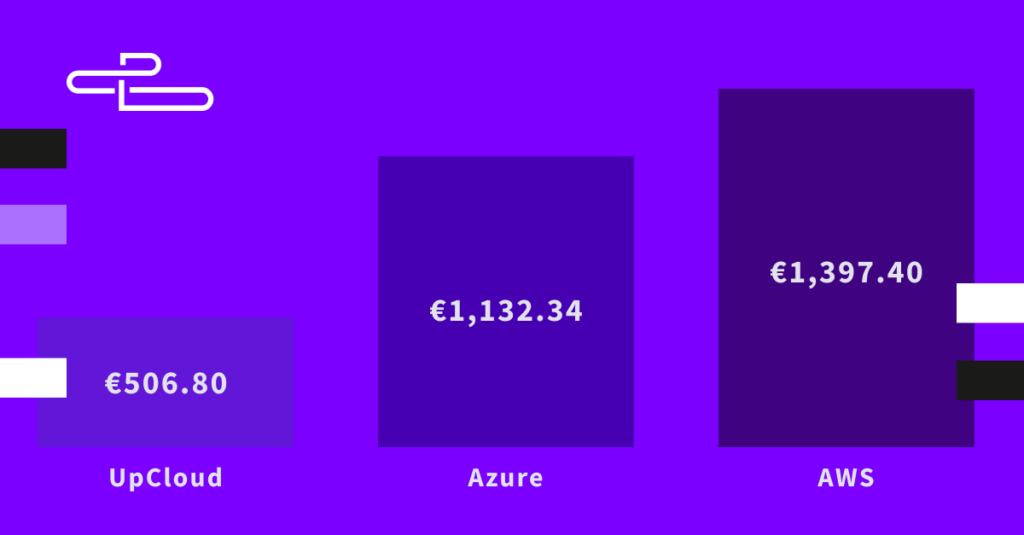It is that time of the year: Black Friday and Christmas are just around the corner. For an eCommerce business, that means a great opportunity to increase sales. Traffic spikes are approaching from the horizon – is your eCommerce site ready?
It sure should be. When it comes to the performance of your website or online store, failures have a direct effect on the number of sales. If the page load time is getting out of hand or there are issues with checking out, customers might lose interest in just seconds.
Reliable and fast cloud infrastructure can be trusted when traffic spikes hit and help you sleep at night during the most critical sales period of the year. In this article, we go through 6 steps that help you to prepare for seasonal sales with eCommerce optimisation in the cloud.
1. Take a look at the numbers: analytics & capacity
When preparing for the next traffic spike, it is essential to get acquainted with the previous ones and, after that, to evaluate your website’s current capacity. This helps you to determine your website’s scaling needs.
First, you should analyse the organic and paid traffic. You can do that by using, for example, Google Analytics. Take a look at the trends in traffic over months to hours, and pay extra attention to traffic spikes such as Black Friday and Christmas sales.
Second, figure out your web store’s capacity for concurrent visitors. To do that, you need to monitor and load test performance. You can use a built-in system process monitor tool or a free, specialised monitoring software – Zabbix, for instance.
Third, figure out how far your current infrastructure is going to take you during a traffic spike. You can simulate heavy traffic conditions with a load testing tool such as open-source software Apache JMeter.
2. Increase the resources by server scaling
When testing, you might find out that your web server lacks much-needed resources and, therefore, the performance of your website is at risk. To match the demands heavy traffic comes with, you need to increase the resources available to your cloud servers.
One of the great benefits of cloud hosting is scalability. Server scaling ensures enough capacity in your eCommerce site even when all the customers are rushing there at once. It is easy and cost-effective to add resources when needed and also scale down after the sales season.
Scaling up can be done vertically or horizontally: by adding more power to the cloud server or adding more servers. When utilising the advantages of both and building a suitable resource configuration for your storefront’s demands, your eCommerce infrastructure will adjust smoothly to the traffic spikes. With UpCloud, you can scale up with zero downtime.
3. Improve page load time
The quality of the customer experience determines the success of a sales season. This is where page load time comes into play. Slow websites do not encourage people to buy, and page load times also impact your website’s search engine visibility.
Page load time is a mixture of factors. For example, the available resources, concurrent users, network speeds, web configuration and page size all have something to do with the load time. To figure out how to improve that, you can use online testing tools, such as Pingdom or GTmetrix.
Content Delivery Network, or CDN, can also help with page load times. A CDN brings your content on regional, multiple servers. When the user clicks to your website, the content is loaded from the closest server. Hosting your website geographically closer to your customers improves page load times drastically.
4. Ensure cloud infrastructure resilience
You should take a proper look at cloud infrastructure resilience when considering the security of your site’s underlying infrastructure. When a traffic spike hits, there is always a possibility of failure. And what matters the most is how your cloud provider can operate during it.
Preventing downtime is crucial. Even short interruptions to services can have severe immediate and long-lasting repercussions: lousy user experiences, permanent decreases in sales, and there is even a possibility of data loss.
On that note, when your cloud infrastructure is built for resilience, higher availability is guaranteed meanwhile the risk of downtime decreases. That means a higher return on investment and reduces the need for customer contact.
At UpCloud, all operation critical systems are built with at least N+1 redundancy. In the event of failure, it takes only seconds for the backup system to take over. Frequent backups ensure near-instantaneous recovery for your eCommerce site.
For us, 100% uptime SLA are not just buzzwords. When preparing for possible failures, we make sure to make the recovery process as fast as possible. With monetary compensation for any outages over 5 minutes, we mitigate our customers’ financial risks of downtime.
5. Keep support at hand
Optimising your eCommerce site for traffic spikes is a lot simpler with a reliable partner. When picking a cloud hosting company, make sure a helping hand is available even in unexpected situations.
With cloud hosting, you benefit from the technical expertise of your infrastructure provider. UpCloud offers automated services and plenty of tutorials that enable creating a hassle-free infrastructure for your eCommerce site. Furthermore, we provide local support 24/7 within minutes. We want to ensure you have someone to turn to: you can always have direct personal contact with our in-house support team.
In case of failure, fast communication with your cloud provider also enables you to inform your customers about the issue. That enhances the user experience and builds mutual trust.
6. Prepare for unexpected traffic all year round
Now that your eCommerce infrastructure is on point and ready for increased seasonal traffic, there is an excellent opportunity to ensure that the revenue stream keeps coming.
Optimising your website should not be a one-time thing. If keeping up with the traffic spikes seems like a burden, managed services can help you keep the shopfront up to date. For example, UpCloud Managed Databases ensures built-in resilience and high availability 24/7, every day of the year.
Want to know more about optimising your eCommerce site? Contact us.

